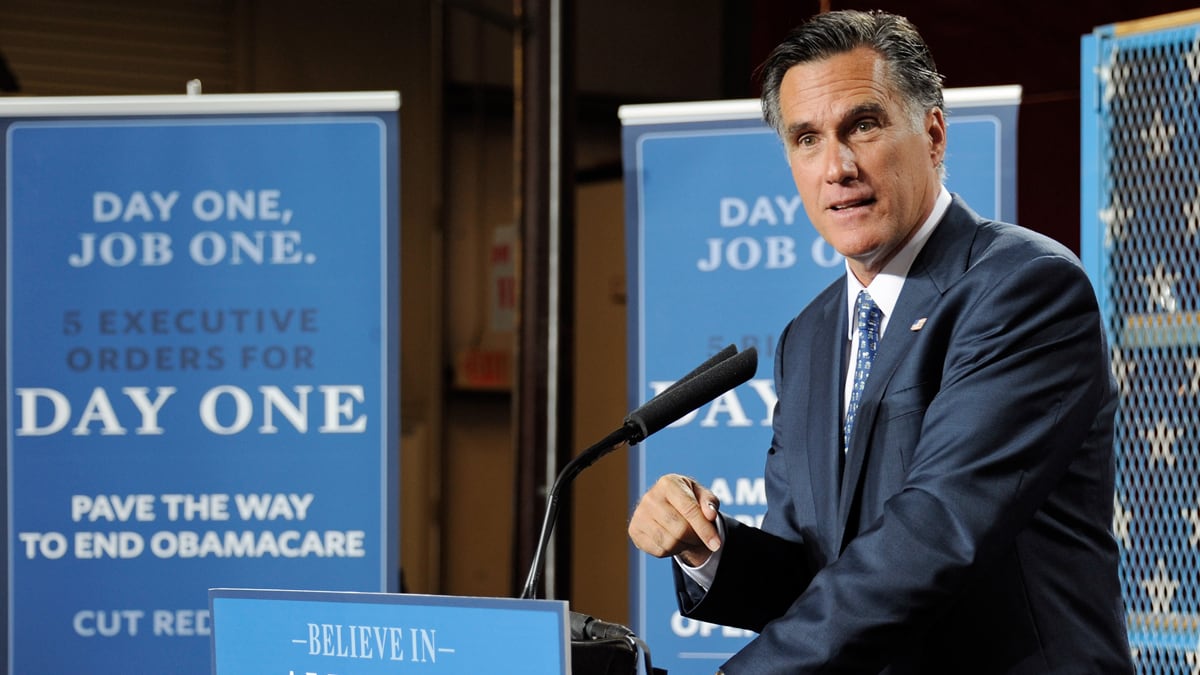While his choice of Rep. Paul Ryan as his veep certainly goes a long way toward clarifying Mitt Romney’s policy preferences, the fact remains that we don’t know a huge amount how about his views on economics and public policy. The tax proposal his campaign released recently was vague, and, as his opponents have gleefully pointed out, Romney has vacillated greatly when it comes to his views of the proper role of government in solving economic problems, from health-insurance shortfalls to the auto bailout.

So there’s a risk that the news of the veep pick will bury a closer analysis of an answer Romney gave to a question from Bloomberg Businessweek, found on the second page of an interview posted earlier this week. That would be unfortunate, because it’s one of the more concise, specific explanations of his economic philosophy we have yet seen:
BB: One thing that distinguishes this recovery is that public sector jobs, government jobs, have already fallen by 650,000. Given the conservative goal of shrinking government, is this a positive development or a negative one?
ROMNEY: Well, clearly you don’t like to hear [about] anyone losing a job. At the same time, government is the least productive—the federal government is the least productive of our economic sectors. The most productive is the private sector. The next most productive is the not-for-profit sector, then comes state and local governments, and finally the federal government. And so moving responsibilities from the federal government to the states or to the private sector will increase productivity. And higher productivity means higher wages for the American worker. All right? America is the highest productivity nation of major nations in the world, and that results in our having, for instance, an average compensation about 30 percent higher than the average compensation in Europe. A government that becomes more productive, that does more with less, is good for the earnings of the American worker, and ultimately it will mean that our taxes don’t have to go up, that small businesses will find it easier to start and grow, and we will be able to add more private sector jobs. Don’t forget! It’s the private sector jobs that pay for government workers. So if you have fewer government workers doing work more and more productively, that means private sector work will grow.
This is a mind-bending level of conflation and oversimplification. What does it even mean to compare the productivity of nonprofit entities, which tend to work toward public or charitable ends, with that of their for-profit counterparts? And how does he figure that state governments are more productive than the federal government?
Unable to fully understand what Romney meant, The Daily Beast emailed a group of economic experts to respond to his hierarchy of productivity and other claims. The ones who replied (who were all left-leaning) were less than impressed.
**
Name: Robert H. Frank
Title: Professor of Economics at Cornell University; author of The Darwin Economy: Liberty, Competition, and the Common Good
Takeaway: “Without police, firefighters, and teachers, there would be no private sector.”
The 650,000 government job losses that Mr. Romney was asked about were not a move toward lean, efficient government. They occurred simply because revenue shortfalls forced state and local governments to lay off huge numbers of police, firefighters, teachers, and other public servants. As Mr. Romney seems to understand, these cutbacks have been perhaps the biggest continuing threat to our fragile economic recovery. For example, when asked during a recent campaign trip to Michigan whether government spending cuts during an economic downturn would be a good idea, he responded that they would “slow down the economy.” Now he celebrates forced government layoffs, saying that the private sector is more productive than government.
But sector productivity comparisons aren’t the issue. Without police, firefighters, and teachers, there would be no private sector. Federal grants to state and local government would not only help preserve valuable government services, it would also be one of the most cost-effective ways of getting our ailing economy back on its feet.
**
Name: Daniel Altman
Title: Professor of Economics at New York University’s Stern School of Business; author of SABOTAGE: How the Republican Party Crippled America’s Economic Recovery
Takeaway: “Romney has not shown that the cuts in government employment are a result of higher productivity rather than simple budgetary pressures.”
It looks like Romney hasn’t done his homework.
Let’s start with jobs in the federal government. The recession ended in June 2009. Since then, overall employment in the public sector has dropped by 642,000 in the seasonally adjusted figures from the Bureau of Labor Statistics. All of this decrease—and more—has come from the postal service (95,200) and state (121,000) and local (519,000) governments. Federal employment outside the postal service—which only represents about 10 percent of employment in the public sector—has actually risen by 93,700…It certainly doesn’t seem like the states are taking on new responsibilities; rather, they’re finding out that they can’t afford to fulfill the responsibilities they’ve already been given.
Romney also talks about the importance of productivity. Higher productivity has often translated into higher wages for American workers, but not lately. The proceeds that come from selling goods and services can go to owners of labor or owners of capital. Lately, owners of capital have been getting the lion’s share in many industries. For example, in the past 25 years, the productivity of American manufacturing workers has risen by 128 percent, but their compensation has actually fallen in real terms. We know Romney makes most of his income from capital, not labor, so he’s one of the winners here.
…[]I’d like to know where Romney got his figures about the relative productivity of the for-profit, non-profit, and government sectors. I don’t think the BLS follows all of those series.
Despite the factual errors here, the basic point that higher productivity in government saves Americans money is correct. The problem is, Romney has not shown that the cuts in government employment are a result of higher productivity rather than simple budgetary pressures.
**
Name: James K. Galbraith
Position: Chair in Government/Business Relations and professor of Government at the University of Texas’s Lyndon B. Johnson School of Public Affairs; author of The Predator State: How Conservatives Abandoned the Free Market and Why Liberals Should Too
Takeaway: “Today practically everything that happens in the private sector depends on effective public regulation: from food safety to air-traffic control to banking. Without the public presence, many of these activities would collapse.”
It’s a perfectly reputable late-18th-century view.
In the world depicted by Adam Smith in The Wealth of Nations, the government was largely a predator, armies and palaces full of knights and lords, supported by farmers and craftsmen in the private sector. The government in those days did almost nothing to support agriculture or manufactures.
The modern world is different. Today practically everything that happens in the private sector depends on effective public regulation: from food safety to air-traffic control to banking. Without the public presence, many of these activities would collapse. Here’s how I put the matter in The Predator State:
“It is the presence, the existence, of a credible government authority—and therefore the willingness and ability of consumers to trust the regulatory system—that distinguishes a developed from an underdeveloped economy. The most advanced economies have the most advanced regulatory systems. There is a precise hierarchy in the development process, with the United States, Canada, Europe, and Japan at its head, which is exactly correlated with regulatory power and practice. These are the governments most competent to handle the technical issues delivered up by the deployment of advanced technology in the production of goods and services. An incompetent government is one that cannot regulate effectively in the conditions under which it operates. The price of that incompetence is economic underdevelopment.”
Of course, there are ways to economize on public spending; we could scrap the F-22, for example. But in general terms, Governor Romney is right that by world standards, real compensation in the U.S. is high. And he is taking direct aim at a key reason why this is so.
**
Name: Jared Bernstein
Title: Senior Fellow at the Center on Budget and Policy Priorities; former chief economist and economic adviser to Vice President Joe Biden
Takeaway: “[D]isinvesting in public goods would clearly lower private-sector productivity, by underfunding productive infrastructure and education of the workforce.”
There are many empirical holes and logical flaws in this response, along with a few good points mixed in.
First off, I’m not aware of evidence that the federal government is the least productive sector, in no small part because our national statistics don’t measure productivity in the public sector. It’s not even clear how you’d do so, because these are public goods and thus their prices/valuation would be tricky to discover.
But, of course, such goods and services are essential—think roads, bridges, water/food safety, public education, defense…
Nor am I aware of any ranking that would put state and local [government] productivity above that of the federal sector.
There is a research literature of the cost effectiveness of privatizing formerly public services. The consensus is, however, generally inconclusive…
All of this means that the assertion that shifting workers from the public to the private sector would lead to higher productivity growth is not correct, nor is there any reason to believe that fewer government workers implies more private-sector workers. There are no commonly accepted models of the economy that would imply such outcomes.
In fact, disinvesting in public goods would clearly lower private-sector productivity, by underfunding productive infrastructure and education of the workforce.
A particularly big problem with this set of assertions, from my perspective, is the blanket claim that higher productivity means higher wages. It’s true and important to recognize that only through higher levels of productivity is there the potential for higher wages. But that clearly has not been the case for middle- and low-wage workers for a long time, as work by the Economic Policy Institute has stressed.
It’s also technically not quite correct to claim we’re the most productive country (see productivity levels here), but such comparisons are tough, all politicians say we are, and we’re always near the top.
The part of this that’s correct is that the private sector pays for much of the public sector. The public sector can generate some of its own revenue through fees and selling public resources, but the way I see it, we need both sectors: a robust private sector to support the public sector, and a strong, efficient, amply funded public sector to provide the infrastructure, legal framework, defense, public safety, and regulatory environment in which that private sector can flourish.





